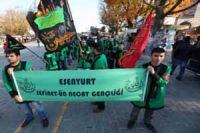 Ankara – Turkey, where Shi'ite Muslims are referred to as Ja'faris, and who made a large minority – in addition to the Alevites, an offshoot of the Shi'ite who are believed to account for one-fourth of the Turkish population – have become a critical issue for Turkey.
Ankara – Turkey, where Shi'ite Muslims are referred to as Ja'faris, and who made a large minority – in addition to the Alevites, an offshoot of the Shi'ite who are believed to account for one-fourth of the Turkish population – have become a critical issue for Turkey.
According to an article in Zaman Today by analyst Gokhan Bajic, Turkey's stance on the Syrian issue, and Turkey's close cooperation with the current Bahraini regime, are being identified as clear signs of Turkey's Sunni foreign policy orientation on the regional crises, despite the fact that the Syrian crisis has nothing to do with the Sunni-Shiite split.
Turkey's support for the current Bahraini government against the long oppressed Shi'ite Muslim majority of that Persian Gulf island State, was criticized along similar lines. Finally, the ongoing Shi'ite Muslim revival in Iraqi politics should be noted.
If Turkey does not want to be seen as the arch-representative of Sunni Muslims, as it claims, it should keep its foreign policy balanced.
It is true that of late, Turkey has knowingly sought to confirm its good will towards the Shi'ite Muslims. Prime Minister Rajab Tayyeb Erdoghan, for instance, met with Grand Ayatollah Seyyed Ali al-Sistani during a recent visit to Iraq.
To the same end, Turkey's diplomatic envoys in Iraq have taken to participating in Ashura gatherings. In response, Grand Ayatollah Sistani declared his appreciation of Turkey's recent efforts at rapprochement with Shi'ite Muslims.
However, Turkey needs a more ambitious agenda to revive its relations with the Shi'ite world. As a first move, it should raise the profile of its relations with the Shi'ite Muslim ulema within it s own borders.
Recently, Turkey's Shi'ite Muslim community had urged the Turkish parliament to declare Ashura or the 10th of Muharram, the martyrdom anniversary of the Prophet's grandson, Imam Husain (AS), as a public holiday. This request should be taken into consideration, since the Turkish government follows a Sufi-oriented Islam.
Selahaddin Özghündüz, the chief leader of Turkish Shi'ite Muslims, completed his religious education in the madrasas of holy Najaf in Iraq. This means, there is no proper mechanism in Turkey for the delivery of religious education to Shi'ite Muslims.
Turkey should immediately construct the legal infrastructure that permits the establishment of Shiite religious schools, and the government should finance a university that is run autonomously by the Ja'fari community. So long as Turkey fails to afford such institutional opportunities to the Shi'ite Muslims, it faces the risk of being marginalized by Shi'ite Muslims.
It is also true that such an agenda should not be seen as a tactical move, but as the duty of the government of a country in which millions of Ja'fari citizens pay state taxes. No matter what its political implications, the government should carry out the reforms that satisfy the needs of Turkey's Shi'ite Muslim community.

















